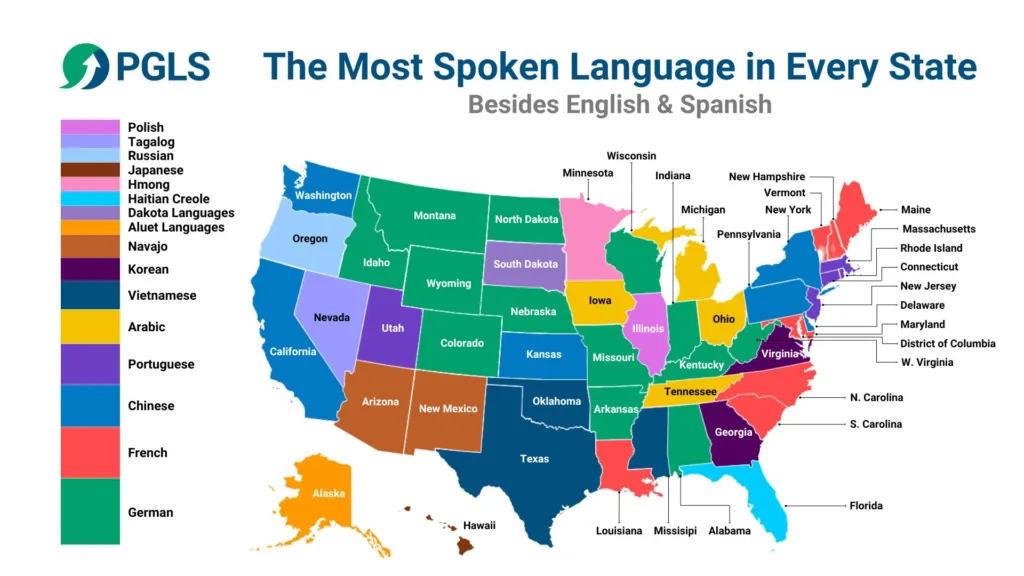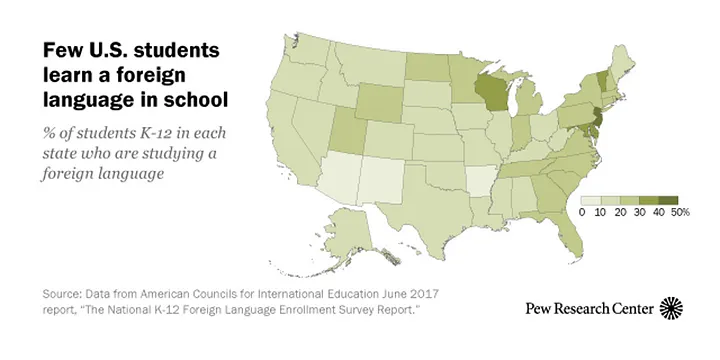The Multilingualism Paradox in the United States
The Decline of Multilingualism in America

It is a common complaint, both within the United States and abroad, that Americans lag far behind Europeans in foreign language skills. In the United States, most people do not study a foreign language in school. Many who have taken French or Spanish for years still struggle to form a basic sentence.
This certainly has not always been the case— a century ago, America was probably one of the most multilingual nations in the world— so why is it now? Of course, we must first acknowledge that as English speakers, Americans win the jackpot in the lottery of global communication.
All the television, music, news, and anything else one would want is readily available in their native tongue. Even when they do leave their vast homeland, which most Americans do only a few times in their lives, they can easily get around with English.
Multilingualism Issue in the United States, Multilingualism Issue, Multilingualism, The Growing Influence of Spanish
The Advantage of English and the Lack of Motivation
Except, of course, for those who grow up in immigrant households, there is just no strong reason to learn a new language. Many Americans even feel a certain satisfaction in their refusal to speak any other language. Many remote workers are in Miami, often called the capital of Latin America.

Some individuals there are impressively fluent in Spanish but choose not to speak it. This contrasts sharply with experiences in Germany, where families frequently encourage young relatives to practice their English skills by conversing with native speakers.
To be fair, for all English’s advantages, it is also something of an exception among Western European languages. Spaniards can easily pick up Italian, or Germans Dutch, but English speakers face a pretty steep challenge. The same issue helps explain why Czechs are so much more linguistically adept than Hungarians, or Indians than Chinese.
It is also not entirely unique to America. Like so many other Anglo-Saxon traits, it is similarly applied to Britons. Brazilians struggle even more, and most East Asian countries fare even worse.
A few years ago, a Canadian politician saw his rising career fall because he refused to learn French. And then there is the bizarre case of the French themselves, who revel simultaneously in cosmopolitanism, and in the most unyielding language chauvinism anywhere in the world.
Language Education and Its Failings

America’s language education system also shares some of the blame. It is abysmal. Students often spend years memorizing obscure grammar rules before ever being expected to have a conversation. This curriculum may be appropriate for Latin, but not so much for its living offspring. Some Americans believe in offering education in other languages, particularly Spanish, to those who do not speak English as their first language. Of course, embracing diversity and making people feel welcome is a positive thing. But virtue can be turned to fault.
Today’s Americans take the benefits of linguistic unity for granted, and assume monolingualism is a shortcoming. But it is worth flipping this entire issue on its perspective.
Multilingualism Issue in the United States, Multilingualism Issue, Multilingualism, The Growing Influence of Spanish
Global Language Divides and America’s Past Struggles
In many countries around the world, language is extremely contentious. In Africa, people typically prefer to do official business in English (or French or Portuguese), which no community speaks natively, to avoid strife. Even in enlightened Western nations like Belgium, Canada, and Spain, language imposes a towering obstacle between people. Elsewhere, things often get violent.
America used to have these sorts of problems. Nativist politicians thrived on voters’ frustration over being unable to navigate parts of Lower Manhattan without speaking German. Surprisingly, not long ago, the Ku Klux Klan was active in predominantly white Maine, attempting to drive out the French. The victims of the biggest mob execution in US history were Italian.
Many European countries, which had negligible historic experience of large-scale migration, are experiencing this sort of turmoil now. Despite what some Fox pundits may claim, it is extremely rare to find a community in the United States where you cannot get by using the national language. Not so across the Atlantic.
In various European cities, from Luton to Milan, the situation is quite different. There’s even a concerning trend of reverse assimilation. In Berlin, for example, there are areas predominantly inhabited by Turkish communities, where many third- or fourth-generation young people struggle to speak German. Today, the historic Paris suburb of Saint-Denis offers a glimpse of an alternative history, as if the Battle of Tours had turned out differently.
This doesn’t even take into account countries with multiple native language communities. It sounds fascinating that many Swiss people speak at least two of their country’s four languages, plus English.
It is less impressive for, to take an example, Belgium, which is basically a linguistic apartheid state where in the past few decades alone three national governments have been toppled because residents of various small towns wanted to speak French instead of Dutch.
The Growing Influence of Spanish and Latino Assimilation

Today, Spanish is America’s second-most spoken language by far. However, an increasing number of Latino Americans speak only English.(Whatever else we may think of it, the growing share of Latinos who selected the box for Donald Trump in last year’s US presidential election suggests surprising assimilation to a certain brand of national identity).
A few years ago, Apple released a very helpful hybrid keyboard to accommodate the millions of Americans who speak both languages, often within the same sentence.
Celebrating America’s Unique Cultural Integration
Learning and speaking multiple languages is fantastic, and Americans should try to catch up in our age of global connectivity. But they should not forget to celebrate the continuing triumph of cultural integration that makes their country unique. Today the historic Paris suburb of Saint-Denis is a glimpse of an alternative history where the Battle of Tours went another way. Ref
Here you can find Is America Stands Alone?
Multilingualism Issue, Multilingualism, The Growing Influence of Spanish
